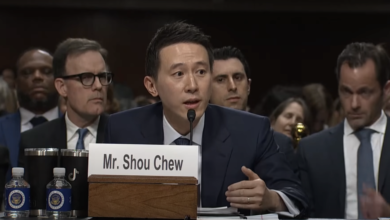While millions of people worldwide have marched against the wars in Iraq and Afghanistan, and last week’s New York Times/CBS News poll indicated that 81 percent believe the country is headed in the wrong direction—key concerns being the war and the economy—the war machine inexorably grinds on.
Amid this political atmosphere, dockworkers of the International Longshore and Warehouse Union have decided to stop work for eight hours in all U.S. West Coast ports on May 1, International Workers’ Day, to call for an end to the war.
This decision came after an impassioned debate where the union’s Vietnam veterans turned the tide of opinion in favor of the anti-war resolution. The motion called it an imperial action for oil in which the lives of working-class youth and Iraqi civilians were being wasted and declared May Day a “no peace, no work” holiday. Angered after supporting Democrats who received a mandate to end the war but who now continue to fund it, longshoremen decided to exercise their political power on the docks.
Last month, in response to the union’s declaration, the Pacific Maritime Association, the West Coast employer association of shipowners, stevedore companies and terminal operators, declared its opposition to the union’s protest. Thus, the stage is set for a conflict in the run up to the longshore contract negotiations.
The last set of contentious negotiations (in 2002) took place during the period between the 9/11 terrorist attacks and the invasion of Iraq. Representatives of the Bush administration threatened that if there were any of the usual job actions during contract bargaining, then troops would occupy the docks because such actions would jeopardize “national security.” Yet, when the PMA employers locked out the longshoremen and shut down West Coast ports for 11 days, the “security” issue vanished. President Bush then invoked the Taft-Hartley Act, forcing longshoremen back to work under conditions favorable to the employers.
The San Francisco longshore union has a proud history of opposition to the war in Iraq, being the first union to call for an end to the war and immediate withdrawal of troops. Representatives of the union spoke at anti-war rallies in February 2003, including one in London attended by nearly 2 million people, the largest ever held in Britain. Executive board member Clarence Thomas went to Iraq with a delegation to observe workers’ rights during the occupation.
At the start of the war in Iraq, hundreds of protesters demonstrated on the Oakland docks, and longshoremen honored their picket lines. Without warning, police in riot gear opened fire with so-called less-than-lethal weapons, shooting protesters and longshoremen alike with wooden dowels, rubber bullets, pellet bags, concussion grenades and tear gas. A U.N. Human Rights Commission investigator characterized the Oakland police attack as “the most violent” against anti-war protesters in the United States.
And finally, last year, two Black longshoremen going to work in the port of Sacramento were beaten, maced and arrested by police under the rubric of Homeland Security regulations ordained by the “war on terror.”
There is precedent for this action. In the 50s, French dockworkers refused to load war materiel on ships headed for Indochina, and helped to bring that colonial war to an end. At the ILWU’s convention in San Francisco in 2003, A. Q. McElrath, an octogenarian University of Hawaii regent and former ILWU organizer from the pineapple canneries, challenged the delegates to act for social justice, invoking the union’s slogan, “An injury to one is an injury to all.” She concluded, “The cudgel is on the ground. Will you pick it up?”
It appears that longshore workers may be doing just that on May Day and calling on immigrant workers and others to join them.
May Day protest
WHEN: 10:30 a.m., May 1, followed by a rally at noon.
WHERE: Longshore Union Hall, corner of Mason and Beach (near Fisherman’s Wharf).
WHAT: March to a rally at Justin Herman Plaza along the Embarcadero.
FOR MORE INFORMATION: www.maydayilwu. googlepages. com; www.ilwu.org; www.transportworker s.org or call (415) 776-8100.
Jack Heyman is a longshoreman who works on the Oakland docks.
7 3 minutes read





